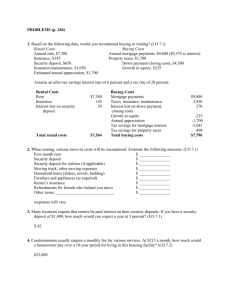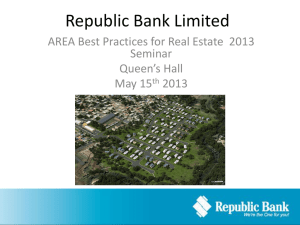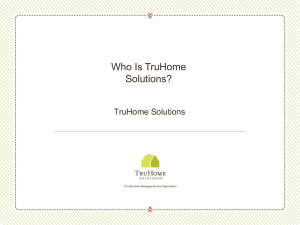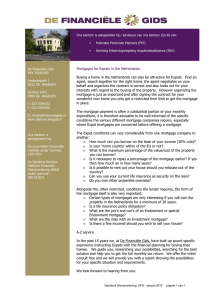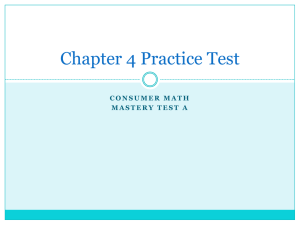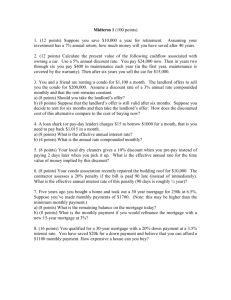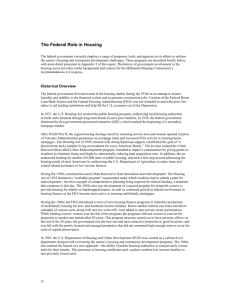Chapter 7 Solutions
advertisement
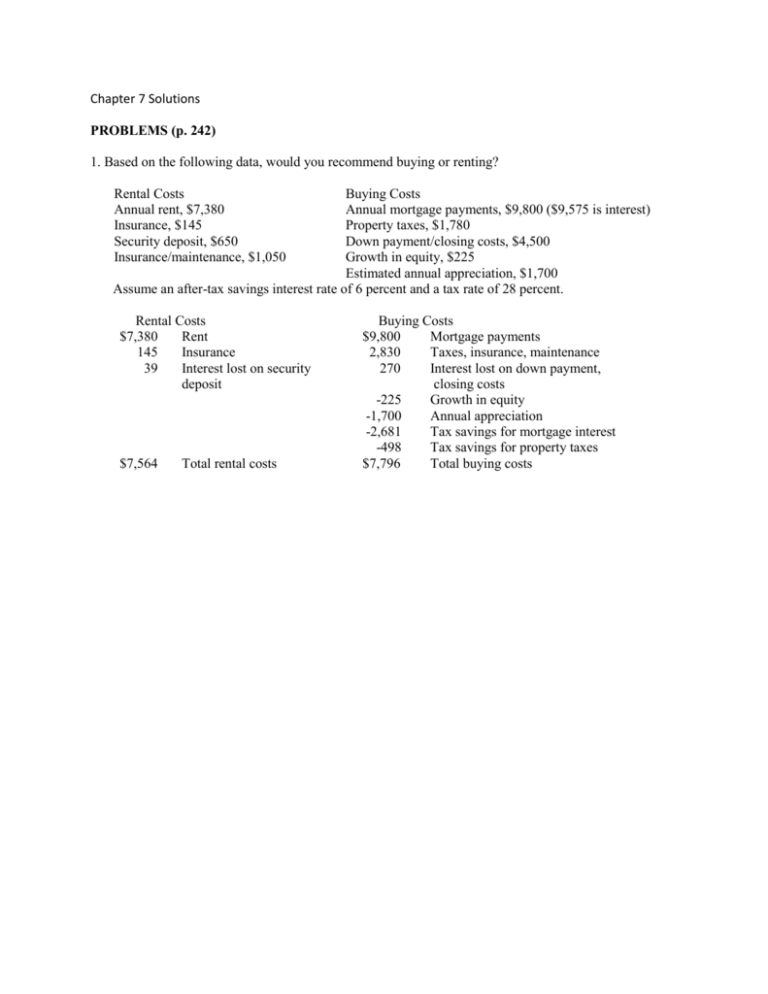
Chapter 7 Solutions PROBLEMS (p. 242) 1. Based on the following data, would you recommend buying or renting? Rental Costs Annual rent, $7,380 Insurance, $145 Security deposit, $650 Insurance/maintenance, $1,050 Buying Costs Annual mortgage payments, $9,800 ($9,575 is interest) Property taxes, $1,780 Down payment/closing costs, $4,500 Growth in equity, $225 Estimated annual appreciation, $1,700 Assume an after-tax savings interest rate of 6 percent and a tax rate of 28 percent. Rental Costs $7,380 Rent 145 Insurance 39 Interest lost on security deposit $7,564 Total rental costs Buying Costs $9,800 Mortgage payments 2,830 Taxes, insurance, maintenance 270 Interest lost on down payment, closing costs -225 Growth in equity -1,700 Annual appreciation -2,681 Tax savings for mortgage interest -498 Tax savings for property taxes $7,796 Total buying costs 2. When renting, various move-in costs will be encountered. Estimate the following amounts: First month rent Security deposit Security deposit for utilities (if applicable) Moving truck, other moving expenses Household items (dishes, towels, bedding) Furniture and appliances (as required) Renter’s insurance Refreshments for friends who helped you move Other items ___________________________ $________ $________ $________ $________ $________ $________ $________ $________ $________ Student responses will vary. Encourage students to point out ways for obtaining this information and for minimizing their rental move-in costs. 3. Many locations require that renters be paid interest on their security deposits. If you have a security deposit of $1,150, how much would you expect a year at 3 percent? $ 34.50 = $1,150 x .03 4. Condominiums usually require a monthly fee for various services. At $160 a month, how much would a homeowner pay over a 10-year period for living in this housing facility? $19,200 = $160 x 12 months x 10 years. 5. Ben and Vicki Manchester plan to buy a condominium. They will obtain a $150,000, 30-year mortgage, at 6 percent. Their annual property taxes are expected to be $1,800. Property insurance is $480 a year, and the condo association fee is $220 a month. Based on these items, determine the total monthly housing payment for the Manchesters. Monthly mortgage payment: $6.00 X 150 = $900 Monthly property taxes: $1,800 / 12 = $150 Monthly property insurance: $480/12 = $40 Monthly association fee: $220 Total monthly housing payment: $1,310 6. Estimate the affordable monthly mortgage payment, the affordable mortgage amount, and the affordable home purchase price for the following situation (see Exhibit 7–6). Monthly gross income, $2,950 Other debt (monthly payment), $160 30-year loan at 8 percent. Down payment to be made—15 percent of purchase price Monthly estimate for property taxes and insurance, $210 Based on example A (with other debts), Exhibit 7-6 (p. ___) Affordable monthly mortgage payment, $751 Affordable mortgage amount, $102,316 Affordable home purchase, $120,372 7. Based on Exhibit 7–7, what would be the monthly mortgage payments for each of the following situations? a. A $140,000, 15-year loan at 8.5 percent. $9.85 140 = $1,379 b. A $215,000, 30-year loan at 7 percent. $6.65 215 = $1,429.75 c. A $165,000, 20-year loan at 8 percent. $8.36 165 = $1,379.40 8. Which mortgage would result in higher total payments? Mortgage A: $985 a month for 30 years Mortgage B: $780 a month for 5 years and $1,056 for 25 years A: $985 360 months = $354,600 B: ($780 60 months) + ($1,065 300 months) = $366,300 9. If an adjustable-rate 30-year mortgage for $120,000 starts at 5.5 percent and increases to 6.5 percent, what is the amount of increase of the monthly payment? (Use Exhibit 7–7) 120 X $5.68 = $681.60; 120 X $6.32 = $758.40; $758.40 – $681.60 = $76.80 Or, $6.32 – $5.68 X 120 = $76.80 10. Kelly and Tim Jones plan to refinance their mortgage to obtain a lower interest rate. They will reduce their mortgage payments by $56 a month. Their closing costs for refinancing will be $1,670. How long will it take them to cover the cost of refinancing? $1,670 ÷ $56 = 29.82 (about 30 months; two and a half years) 11. In an attempt to have funds for a down payment five years, Jan Carlson plans to save $3,000 a year for the next five years. With an interest rate of 4 percent, what amount will Jan have available for a down payment after the five years? $3,000 X 5.416 = $16,248 12. Based on Exhibit 7-9, if you were buying a home, what would be the approximate total closing costs (excluding the down payment)? As an alternative, obtain actual figures for the closing items by contacting various real estate organizations or by doing online research. Student answers will vary based on estimates using Exhibit 7-9. 13. You estimate that you can save $3,800 by selling your home yourself rather than using a real estate agent. What would be the future value of that amount if invested for five years at 6 percent? $3,800 1.403 = $5,331.40
